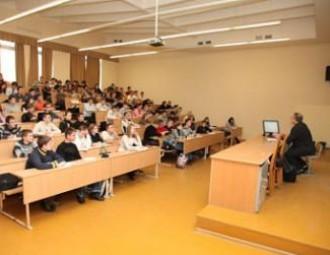The report on the abuse of academic freedoms violations in Belarusan higher education institutions will be sent to the national universities where violations were registered.
This was reported during the presentation of the report on the Results of the Monitoring of Academic Freedoms Violations in Belarusan Higher Education Institutions for September-December of 2012.
Monitoring of Academic Freedoms Violations in Belarusan Higher Education Institutions is carried out by the “Center for Development of Students’ Initiatives” and the “Salidarnasc” Committee within the Public Bologna Committee activity.
As Dmitry Gomeniuk, the director of the “Center for Development of Students’ Initiatives” explained, the aim of the monitoring launched last year is to estimate the real scale of academic freedom violations in Belarus, as well as to promote reduction of such violations through the educational mission, reminding the students and the lecturers about their rights and freedoms.
From September to December of 2012 observers and monitoring organizers paid attention to the investigation of the academic freedoms violations in the sphere of the early vote, forced labor, as well as to the problems of pressure onto the lecturers from the side of the state bodies and university administration.
The information about the violations is submitted to the Public Bologna Committee activity by about 80 observers – students and lecturers in the universities throughout Belarus. The information is gathered from the Mass Media as well.
After receiving the information about the cases of the academic freedoms violations, the data is verified and specified by the organizers of the monitoring; then it is passed to the panel of lawyers, who consider and determine each case.
For the stated time 21 reports on the violations during the early vote were verified. Though this number is not that big, each case indicates the mass character of the students’ enforcement, which makes it possible to talk about the systematic violations.
If last year violations mostly concerned expulsions of students for political reasons, then 2012 was noted for the unprecedented growth of students’ involvement to the forced labor. For instance, in the Belarusian State Agricultural Academy students’ involvement into laying the pavement tile before “Dazhynki” was accounted for as practical training. They were forced to turn up for work under threat that they can be deprived of their dormitory; they were also threatened with having problems with the future exams.
Labor-law violations in the wages’ line were indicated as well. Thus, in Vitebsk Region while working from 9 a.m. till 6 p.m. students were paid half the number of the minimal pay level.
The cases of pressure upon lecturers from the side of the state bodies and university administration were registered, too. Thus, there are facts of violations of academic freedoms in the Yanka Kupala State University of Hrodna, notably the freedom of publication and the freedom of expression of opinion by the members of an academic community.
- First, the violation of the right to free vote guaranteed by Article 38 of the Constitution and by Article 5 of the Electoral Code, which can be qualified either as an administrative or as a criminal offence depending on the circumstances.
Secondly, the education institution breaches of duty to ensure the education quality (paragraph No.4.1 and paragraph No.4 of the Education Code), as the arbitrary release from studies can cause late fulfillment of curriculum.
Thirdly, the breach of the ban to exploit the education process for political purposesestablished by paragraph No.3 of the Education Code. Any calls to vote for this or that candidate break this ban, - described the juridical part of the monitoring the lawyer of the expert group Aliaksandr Kupchenia.
The report on the Monitoring is published on the website of the Public Bologna Committee. They will be also directed to the Ministry of Education and European organizations and institutions which decide upon the admission of Belarus to Bologna process in 2015.
Belarusan universities should know they are under public supervision, assume the organizers of the monitoring.
- Let the European academicians hear about their Belarusan colleagues who break academic rights and freedoms. Perhaps, the administration of our universities will beware of the breaches next time because of the fear to “lose face”, knowing that the information about these breaches will be made public, - said the member of the Public Bologna Committee.
- It is necessary that the students, university applicants, lecturers and the general public will know the true state of the academic freedoms in Belarus. We need the public discourse to develop, which would make people demand positive changes in the Belarusan higher education, - noted the chairperson of the “Salidarnasc” Committee Ina Kulei.
The practice of students’ enforcement for the early vote breaks the norms of the administrative, criminal, electoral and education law, says the report on Monitoring. The authorities use the higher education system as an instrument to achieve political goals, which testifies to the politicization of the higher school.
- In such situation academic freedoms, student self-government and university autonomy are violated, and they make up fundamental values on which the European model of higher education is built, - specified Uladzimir Dunaeu. – All this created barriers for Belarus’ accession to the European Higher Education Area (EHEA). The desire of the Ministry of Education of Belarus to entry Bologna process contradicts what happens in the universities in reality. Our goal is not to block the entry of Belarus to the Bologna process, but to assist in its benefiting for the Belarusan society instead of being just formal.




























